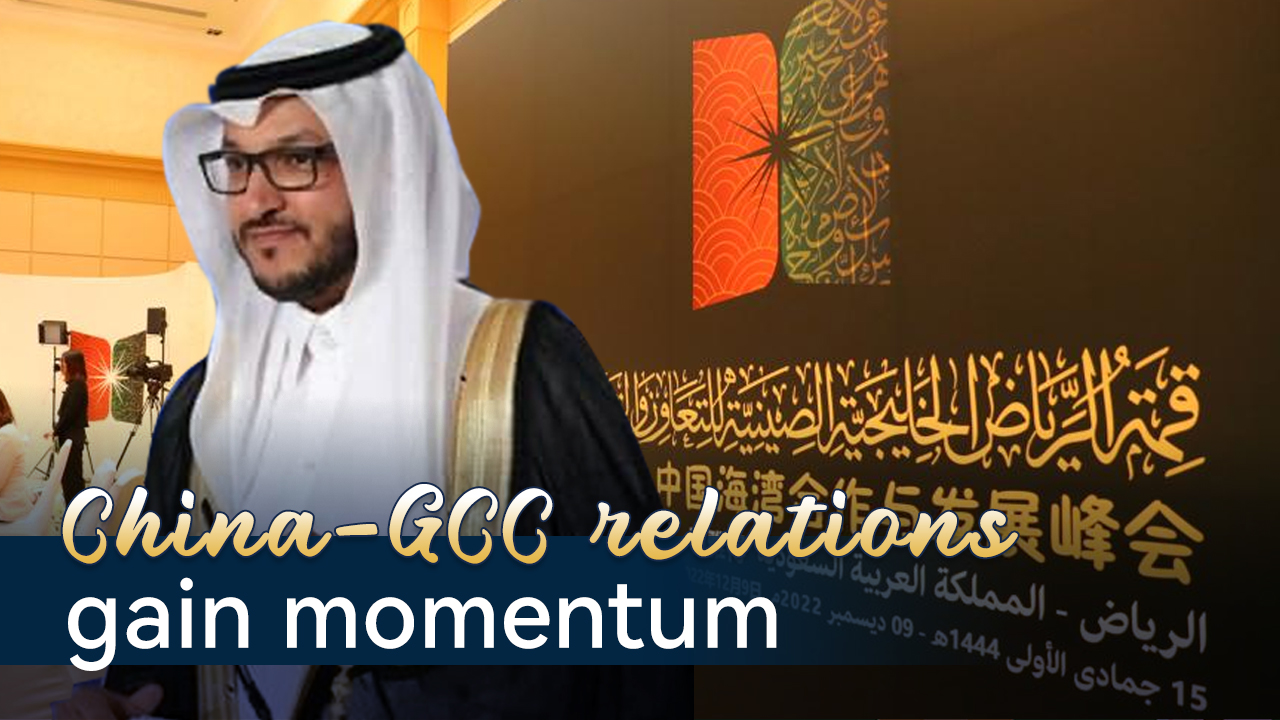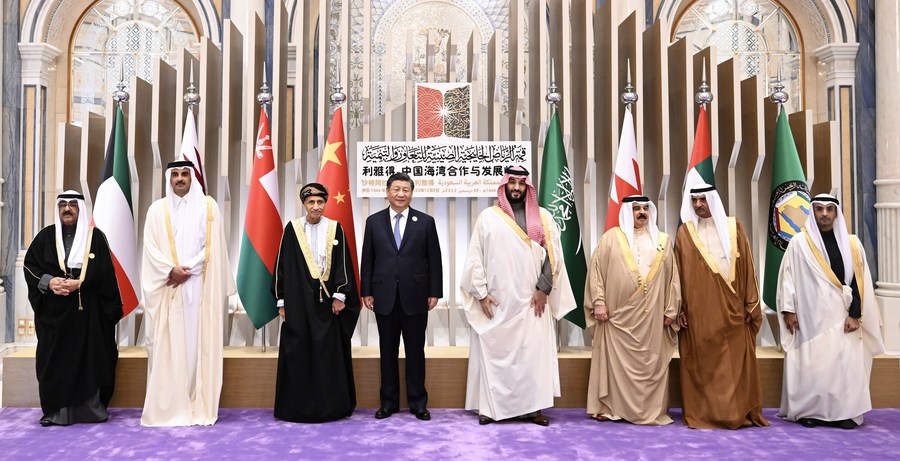04:13

Editor's note: Abhishek G Bhaya is a senior journalist and international affairs commentator. The article reflects the author's opinions and not necessarily the views of CGTN.
Driven by the zeal to lessen their dependence on oil and energy, the Gulf Cooperation Council (GCC) states are looking to prioritize technology cooperation with China as they seek more knowledge transfers from Beijing to aid the diversification of their economies, a prominent Saudi political analyst told CGTN as the two sides held a high-powered China-GCC Summit in Riyadh on Friday.
"We are building our economies and trying our best to diversify our income to not be tied completely to the hydrocarbon industry. In order to achieve that, we need to have new streams of income and we can't get there without having the latest technology," elucidated Salman Al-Ansari in an interview via Zoom from the Saudi capital.
"For that reason, we are actually very committed to developing and enhancing our relationship with the Chinese government and to put the transfer of knowledge at the highest priority," he explained.
The GCC includes the six oil-rich Arabian Peninsula states of Saudi Arabia, Oman, the United Arab Emirates (UAE), Qatar, Kuwait and Bahrain.
Chinese President Xi Jinping during his meeting with the GCC leaders at the China-GCC Summit on Friday proposed five major areas of cooperation in the next three to five years: energy, finance and investment, innovation and new technologies, aerospace, and, language and cultures.
Xi also called for a working mechanism for bilateral investment and economic cooperation and deepening digital currency cooperation, as well as building a big data and cloud computing center with the GCC countries.

L-R: Kuwaiti Crown Prince Sheikh Mishal Al-Ahmad Al-Jaber Al-Sabah, Qatari Emir Sheikh Tamim bin Hamad Al Thani, Oman's Deputy Prime Minister for the Council of Ministers Sayyid Fahd bin Mahmoud Al Said, Chinese President Xi Jinping, Saudi Crown Prince and Prime Minister Mohammed bin Salman Al Saud, Bahraini King Hamad bin Isa Al Khalifa, Ruler of Fujairah of the UAE Sheikh Hamad bin Mohammed Al Sharqi, and GCC Secretary-General Dr Nayef Falah Al-Hajraf at the China-GCC Summit, Riyadh, Saudi Arabia, December 9, 2022. /Xinhua
L-R: Kuwaiti Crown Prince Sheikh Mishal Al-Ahmad Al-Jaber Al-Sabah, Qatari Emir Sheikh Tamim bin Hamad Al Thani, Oman's Deputy Prime Minister for the Council of Ministers Sayyid Fahd bin Mahmoud Al Said, Chinese President Xi Jinping, Saudi Crown Prince and Prime Minister Mohammed bin Salman Al Saud, Bahraini King Hamad bin Isa Al Khalifa, Ruler of Fujairah of the UAE Sheikh Hamad bin Mohammed Al Sharqi, and GCC Secretary-General Dr Nayef Falah Al-Hajraf at the China-GCC Summit, Riyadh, Saudi Arabia, December 9, 2022. /Xinhua
"There are a lot of fields that the GCC nations would love to cooperate with the Chinese government and specifically in the areas of knowledge transfer [of new technologies]," re-emphasized Al-Ansari noting that all the six GCC countries see this as a key to their economic diversification goals.
The objective of GCC countries' national digital plans also converges with China's Digital Silk Road under the framework of its Belt and Road Initiative (BRI). The Saudi analyst noted that Chinese tech firms are already at the forefront of the ongoing digital transformation in the GCC states.
In May this year, Chinese tech giant Alibaba Group and the Kingdom's state-owned Saudi Telecom Company (STC) established a new joint venture firm with an investment of nearly $238 million to collaborate on cloud computing. Al-Ansari cited this as an example of tech cooperation between Chinese and Arab entities.
Saudi Land Bridge project 'bridges' BRI and Vision 2030
He also mentioned Saudi Arabia's planned railway project linking the eastern and western parts of the Kingdom, referred to as The Land Bridge project. Counted among one of the largest infrastructure projects in the region, it is being designed in cooperation with a consortium led by the Chinese company China Civil Engineering Construction Corporation (CCECC).
"The [Land Bridge] project will be using Chinese firms and companies. And it will help both the Kingdom and China and all the other nations around them," he said, highlighting this as a convergence between China's BRI with the Kingdom's Vision 2030, both of which envision collective benefit and growth of regional partners.
"We are speaking of Vision 2030 where we want to connect the three continents together - Africa, Asia and Europe. Also, China would love to expand its Belt and Road Initiative and its Silk Road [in the region]. So, this is the form of integration between Vision 2030 and the BRI," he elucidated.
Time ripe for China-GCC FTA
At the China-GCC Summit on Friday, the two sides agreed to "make joint efforts to reach common ground on the China-GCC Free Trade Agreement (FTA) at an early date, so as to release positive signals and to help each other achieve better development."
Negotiations for a China-GCC FTA began in 2004. After a brief halt in 2009, talks resumed in 2016 and so far, a total of nine rounds of negotiations have been held. With the latest assurance, many analysts feel that the time is finally ripe for a China-GCC FTA.
China remains the GCC's largest trading partner and largest export market for petrochemical products. China-GCC trade in 2021 exceeded $232 billion. President Xi, in his speech at the China-GCC Summit on Friday, assured China will continue to import more crude oil and liquefied natural gas from the GCC countries.
"Let's not forget that around 40 percent of China's oil imports come from the GCC countries. So, it is of high importance for both sides to develop and enhance their relationship," noted Al-Ansari as he backed expediting the China-GCC FTA talks.
In the years to come, technology-based cooperation is expected to stay prioritized and a China-GCC FTA will go a long way in defining the contours of the evolving digital cooperation between both sides.
Text and interviewer: Abhishek G Bhaya
Video editor: Keerqinfu
Cover image: Li Yueyun
Senior producers: Bi Jianlu, Zhang Peijin and Wang Xinyan
Chief editor: Li Shouen
(If you want to contribute and have specific expertise, please contact us at opinions@cgtn.com. Follow @thouse_opinions on Twitter to discover the latest commentaries on CGTN Opinion section.)